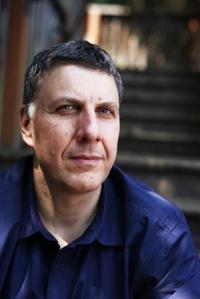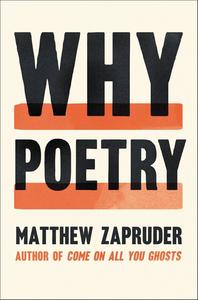
|
|
| photo: B.A. Van Sise | |
Matthew Zapruder is the author of Why Poetry, a book of prose about poetry (Ecco, August 15, 2017), and four poetry collections, most recently Sun Bear (Copper Canyon). An associate professor in the MFA program at Saint Mary's College of California, he is also editor at large at Wave Books, and from 2016 to 2017 held the annually rotating position of editor of the poetry column for the New York Times Magazine. He lives in Oakland, Calif., with his wife and child.
On your nightstand now:
Galley of Stephen Elliott's new book of essays, Sometimes I Think About It. New biographies of John Ashbery (The Songs We Know Best, which focuses on his early life) and of Gwendolyn Brooks (A Surprised Queenhood in the New Black Sun). A marvelous new chapbook of Douglas Crase's poetry, The Astropastorals (which has a reproduction of Trevor Winkfield's incredible painting of the author on the cover). Zadie Smith's Swingtime.
Favorite book when you were a child:
The three books I can remember having the biggest effect on me were D'Aulaires' Book of Norse Myths, which I read obsessively; Watership Down; and the Anne McCaffrey series Dragonriders of Pern.
Your top five authors:
Oof. Okay. In no particular order, here are seven, sorry: John Keats, Emily Dickinson, James Tate, Frank O'Hara, José Saramago, Javier Marías and Elena Ferrante.
Book you've faked reading:
Ulysses. Never read the whole thing. Book you're an evangelist for:
Book you're an evangelist for:
I jumped on the Stoner bandwagon, which my friend Steve Almond has been justifiably pulling for years. It's a gorgeous, heartbreaking, perfect book by John Williams, a book that is now legendary. I think the poetry book I've not only recommended but actually bought for other people the most is Yannis Ritsos's collection of short poems, Exile and Return, translated by Edmund Keeley. I just looked it up and am stunned to discover it's published by Ecco, who is publishing Why Poetry.
Book you've bought for the cover:
A recent reissue of Kafka's The Castle, one of my favorite books. The title is handwritten over a blue cover that, when you look closely, reveals itself as the outline of a tower. A single drawn eye floats in the middle of the cover. It's eerie and perfect.
Book you hid from your parents:
When we were pretty young, my brother and I actually had that mythic experience of finding some porn in the woods (well, not the woods, but a tiny patch of trees, etc., at the end of our street)--not just magazines but actual books. We were too innocent to understand what we were looking at, though there was certainly a vague yet palpable sense of horror. I believe one of the books was called Dial O for Orgy, which I only much later realized was a parody of Dial M for Murder, though I don't remember its contents. Also in the pile was Xaviera Hollander's memoir, The Happy Hooker. One of the magazines featured someone who went by the moniker "White Chocolate," though thankfully I have completely blocked out those images. Though we were young, we absolutely knew that we were supposed to hide these texts and for the most part successfully did, until I think my brother brought one of the magazines to school and all hell broke loose.
Book that changed your life:
Dial O for Orgy. Also, James Tate's The Lost Pilot.
Favorite line from a book:
"Darkly he rose, and then I slept" from "A True Account of Talking to the Sun at Fire Island," in The Selected Poems of Frank O'Hara, edited by Donald Allen.
Five books you'll never part with:
I only have one: the original Oxford University Press edition (from the World's Classics series) of The Lost Domain, a translation by Frank Davison of Alain-Fournier's Le Grand Meaulnes. It is nearly pocket sized, and its cover is pink, with a line drawing of a stone gate. I first read this classic of French literature in high school French class, and barely understood a word of it. Much later I came across this edition in some used bookstore and bought it impulsively. I fell completely in love with the story of young French provincial boys who wander into a great romantic adventure. Alain-Fournier was killed in 1914, in the First World War, and this is his only book.
Book you most want to read again for the first time:
The Lost Domain.
Book of poetry you would recommend to someone who never reads it, but wants to start:
Pablo Neruda's Odes to Common Things. I am partial to Margaret Sayers Peden's translations in Selected Odes of Pablo Neruda, probably because they're the first ones I read, but I recommend any translations of them that seem conversational, simple and direct.

